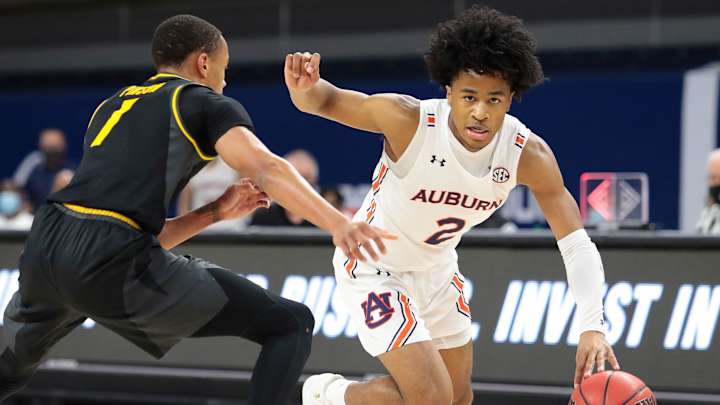'I Knew My Time Would Come:' After Staying Patient, Auburn's Sharife Cooper Focused on Finishing Strong

Seven days a week this winter, promptly just after 5 p.m., Sharife Cooper would throw on his mask, barrel out of his dorm room and hop onto his motorized scooter for a brisk three-minute ride to Auburn Arena to sharpen skills he wasn’t entirely sure anyone would see this season.
The ball’s empty thuds and the steady squeak of his sneakers blended into the music blasting through the loudspeakers in the practice gym.
The echo was hollow; Cooper had never noticed that before.
It was different. Trippy.
Funny how heightened your senses get when you’re alone.
“That’s definitely not something I was used to,” Cooper says. “It was rough.”
In November, the Tigers freshman learned that he would have to sit out all team activities while awaiting the findings of an NCAA investigation into his eligibility.
“When I first heard that, I’m thinking it was gonna be a couple days and then it was gonna be over,” says Cooper. “It was hard because there was never a timetable. They kept saying we should hear something this day or that day and then we get to the day and nothing. That was the hardest part mentally.”
Auburn coach Bruce Pearl called it “fighting the demons.”
Doubt, self-pity, anger, depression and many other emotions accompanied what Cooper referred to as “having your dream taken away.”
“It was harder the more time it took,” Cooper says. “I would’ve been fine just being able to watch and talk to my teammates, but I couldn’t. My family and my coaches were big for me, just being there. It was a faith test, and I had to trust the plan God had for me. I always had in the back of my mind that I wouldn’t lose faith.”
Instead, he re-channeled his emotions into those evening workouts.
For hours, Cooper underwent a rigorous routine of 1,000 shots, dribbling routines, sprints and weightlifting. Pearl followed up with daily check-ins with Cooper to encourage him, connecting on a spiritual level with talks about faith and persistence.
“It was all about making sure he didn’t lose hope,” Pearl says. “It’s always about what’s best for the player with me. Period.”
To that end, Pearl said he and his staff examined all of Cooper’s options, including playing professionally overseas.
After all, Cooper wouldn’t get the chance to compete in the NCAA tournament this season.
In November, Auburn announced it was self-imposing a postseason ban for this season due to the NCAA investigation into former assistant coach Chuck Person.
Person was one of four assistant coaches arrested in September 2017 as part of the FBI investigation into corruption in college basketball.
“It was never something I could see myself doing,” Cooper says of playing overseas. “I always saw myself playing at Auburn with these coaches. I’ve never been a guy to just leave when it gets hard. I knew that my time would come.”
After 72 days and 11 games away from his team, Cooper resumed practices on Dec. 28 and ultimately returned to the lineup on Jan. 9 to post 26 points, nine assists, four rebounds and three steals in a 94–90 loss to Alabama.
Without Cooper, the Tigers were 6–5 overall and winless in the SEC; they’re 4–4 since his return. In those eight games, Cooper is averaging 21.3 points, 8.3 assists and 4.8 rebounds a game.
That production has catapulted Cooper into the lottery portion of most NBA draft boards, a position he always envisioned for himself despite being undervalued in high school.
Yes, Cooper was a McDonald’s All American, but his long-term projection never aligned with his dominance.
From carrying his high school team to a perfect 32–0 record to leading the prestigious Nike Peach Jam in scoring and assists to knocking off nine of the top 25 teams in the country, Cooper dominated all comers whenever he stepped onto the court. Last season, he was named to the SI All-American first team.
Still, his stature (6’ 1”, 180 pounds) always seemed to give recruiting gurus pause regarding his NBA potential.
“I’ve always loved speed and quickness over size,” says Pearl. “Especially at that position. Our system is for fast, small and quick point guards. It’s about spread, ball screens and pace. You can’t deny his level of talent. He’s not worried about the NBA though; he knows that’s the endgame.”
When asked if he felt vindicated by his sudden appearances in NBA mock draft lotteries, Cooper simply smiled and said, “I’m just focused on Auburn. That’s the only thing I’m thinking about right now.”
Pearl says that when the time comes to make a decision about Cooper’s future, “there will be reasons to stay and there will be reasons to go.”
“And they’ll all be good reasons,” the Tigers’ coach says. “We’ll get great information; he’ll get great counsel from his dad and we’ll know. Let’s have that conversation again in April, but if he’s gonna be a first rounder, I’m like this: You don’t gotta go, but you’ve gotta get the hell up outta here.”
While he’s around, Cooper’s focus remains twofold: Winning and improving his three-point shooting deficiency. He’s connecting on just 20.6% of his threes this season, a stat that he finds more exciting than annoying.
As a high school senior last season, Cooper shot 48% from the three-point line and he consistently hovered around 80% on 1,000 shots using the shooting gun while awaiting clearance from the NCAA.
“I love the challenge of it, I don’t get in my head about it,” Cooper says of his outside shooting. “I know I can shoot. It’s all about rhythm and confidence. Not excuses. My whole focus is trying to be first in the SEC. That’s always been my goal, to win before everything else. It’s been tough, but we’ll figure it out.”
